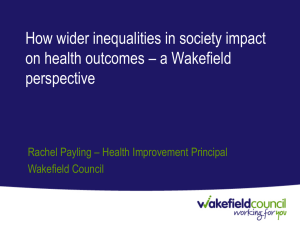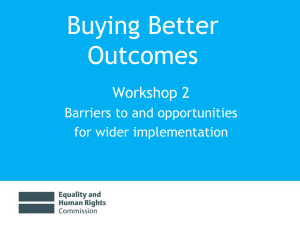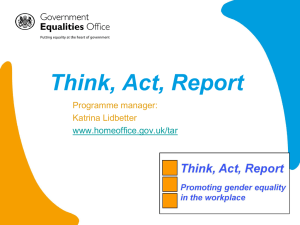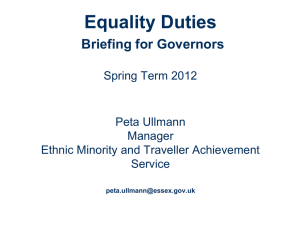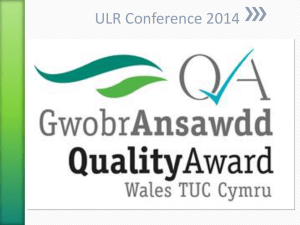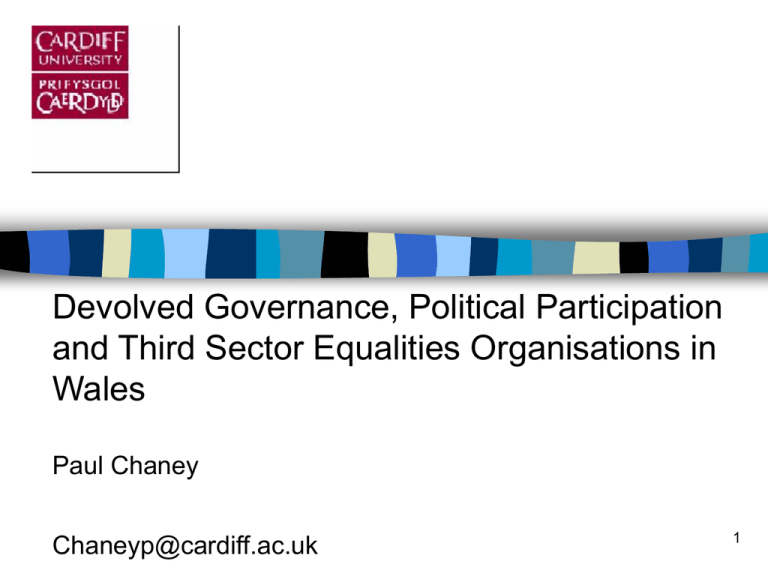
Devolved Governance, Political Participation
and Third Sector Equalities Organisations in
Wales
Paul Chaney
Chaneyp@cardiff.ac.uk
1
Content
Aims/ methods/ evaluation criteria
Context
The Third Sector in Wales
‘Inclusive Governance’ – structures of
engagement (?)
Evidence: the nature and extent of postdevolution engagement in work of govt.
–
–
–
–
–
–
Ministerial meetings with 3rd sector reps
Govt. Funding of third sector policy networks
Assembly cross- party equality committee
The views of members of 3rd sector orgs
Petitions Committee
Electoral Politics
Summary: Critical evaluation of third sector
2
Methods/ Evaluation Criteria
Methods
– Qualitative – semi structured interviews
– Purposive sample 3rd sector equalities
organisations
Evaluation Criteria
– Pro-devolution discourse > ‘a new, more
inclusive and participatory democracy’
(Welsh Office,1998:19).
– Neo-institutionalist perspective
– Mainstreaming
3
Mainstreaming:
‘the integration of respect for diversity
and equality of opportunity principles,
strategies and practices into the every
day work of [government …] and other
public bodies. It means that equality
issues should be included from the
outset as an integral part of the policymaking and service delivery process
and the achievement of equality should
inform all aspects of the work of every
individual within an organisation’. (NAfW
2004:6).
4
Context: Devolution and the
Discourse of 3rd Sector engagement
Third Sector offers alternative to centralised
state practices (Hain, 1999).
the Assembly will be able to develop … [a]
partnership; the Government will encourage it
to harness the special contribution which
voluntary organizations can make in a wide
range of policy areas’ (Welsh Office, 1998:19).
‘if the Assembly is to fulfil the expectations of
operating inclusively and in partnership with
others, then it will need to work closely with
voluntary and community organizations’
(WCVA, 1999:8).
5
Forum heading
WCVA classification
Total (Number
Scope of operation
Gender
Men
Women
Ethnic minorities
Refugees
Ethnic minorities
Religion
Religious organisations
Disability
Physical disabilities
Learning disabilities
Children and Families
Family welfare
Children
Youth
Youth
TOTAL
of organisations)
National
Regional
Local
Branch
Project
60
72
1689
25
9
0.2%
0.3%
5.9%
0.1%
0.0%
21
20
238
3
2
0.1%
0.1%
0.8%
0.0%
0.0%
53
67
1476
24
7
0.2%
0.2%
5.1%
0.1%
0.0%
62
43
232
15
11
0.2%
0.2%
0.8%
0.1%
0.0%
20
2
11
4
0
0.1%
0.0%
0.0%
0.0%
%
55
43
226
14
11
0.2%
0.2%
0.8%
0.1%
0.0%
113
123
3512
17
7
0.4%
0.4%
12.2%
0.1%
0.0%
113
123
3512
17
7
0.4%
0.4%
12.2%
0.1%
0.0%
154
168
1143
151
63
0.5%
0.6%
4.0%
0.5%
0.2%
132
132
873
98
42
0.5%
0.5%
3.0%
0.3%
0.2%
86
97
630
107
40
0.3%
0.3%
2.2%
0.4%
0.1%
163
140
2724
116
110
0.6%
0.5%
9.5%
0.4%
0.4%
76
55
415
72
86
0.3%
0.2%
1.4%
0.3%
0.3%
133
119
2524
68
84
0.5%
0.4%
8.8%
0.2%
0.3%
140
142
2227
58
61
0.5%
0.5%
7.8%
0.2%
0.2%
140
142
2227
58
61
0.5%
0.5%
7.8%
0.2%
0.2%
692
688
11527
382
261
Table 8.0. Details of Equalities –related Voluntary Organisations from the All
Wales Database of Voluntary organisations (WCVA, 2008).
% of
whole
sector1
1855
6.5
284
1.0
1627
5.7
363
1.3
37
0.1
349
1.2
3772
13.1
3772
13.1
1679
5.8
1277
4.4
960
3.3
3253
11.3
704
2.5
2928
10.2
2628
9.1
2628
9.1
13550
47.1
6
‘Inclusive Governance’ – structures of
3rd sector engagement (?)
Statutory Equality Duty (S.77, GOWA)
Cross- Party Equality Committee
(Standing Order 17)
WAG Equality and Human Rights Unit
Voluntary Sector Scheme (S.74 GOWA,
2006)
– Third Sector Partnership Council
Petitions Committee (post GOWA, 2006)
(SO.28)
7
Voluntary Sector Scheme
‘the goal is the creation of a civil society
which: has a duty to promote equality of
opportunity to all its members
regardless of race, colour, sex, sexual
orientation, age, marital status,
disability, language preference, religion
or family/domestic responsibilities’
(NAfW, 2000).
8
Key topic
Examples of Policy Discussions around each Topic in Ministerial Meetings
Disability
Concerns from voluntary sector about the availability of funding for implementation of new Strategy on
Disability and the Arts, discussion of implementation of recommendations around disability in WAG
‘Climbing Higher’ Sports Strategy, ‘there were voluntary sector provider concerns over therapy. Disabled
children often could not access the relevant services.
Minister updates voluntary sector representatives on WAG’s equal pay campaign, gender balance in the
arts ‘the Minister assured the group that he would ensure that gender balance issues would be addressed in
ASPB’s remit letters, including the collection of relevant gender statistics’,
The voluntary sector expressed concern over schools awareness of diversity… ‘especially within schools
with a low number of BME pupils who sometimes refuse to report racial bullying when it occurs’,
discussion of funding for The North Wales Race Equality Network, discussion of WAG’s Race Equality
Scheme,
It was reported that WAG is represented on the Office for National Statistics Census Topic Group,
discussion of faith in the Statistical Focus on Diversity.
Questioning minister whether EHRC will be covered by the Welsh Language Act’, discussion of how the
Welsh Language could be better represented in the guidance for Communities First economic aid
programme, ‘voluntary sector expressed an interest in how the principles expressed in "Iaith Pawb"
[WAG’s Welsh Language strategy] are integrated into the Minister's portfolio’,
Minister discusses policy around homophobic bullying in schools, discussion of WAG support for sexual
orientation amendments to UK Equality Bill (2005), Stonewall Cymru lobbying the Office for National
Statistics for the collection of Sexual Orientation data,
‘the Minister expressed concerns that the formalised structures of volunteer work and representation may
not be the most appropriate for many of the children and young people in Communities First areas’,
Government minister outlines departmental cross stand equality action plans, discussion of the need for
improved equalities data covering Wales, discussion of the ‘Voluntary Sector’s views on the need for an
equalities fund,
Gender
‘Race’ /
ethnicity
Faith
Language
Sexual
orientation
Age
Generic
equalities
Meetings
when key
topic
discussed
No.
%
16
36
18
40
13
29
3
7
15
33
8
18
10
22
26
58
Figure 9.4. A Nexus for the Advancement of Equalities? Details of 45 Ministerial Meetings
with Voluntary Sector Representatives 2003-07
9
State Sponsoring of 3rd Sector Equalities Networks
Welsh Assembly Government Funded Equality Policy
Networks. All Wales Ethnic Minority Association (AWEMA);
Women’s Voice/ Welsh Women’s National Coalition (WWNC);
LGB Forum Cymru/ Stonewall Cymru; Minority Ethnic Women’s
Network Cymru (MEWN); Disability Wales; Black Voluntary Sector
Network Wales
Policy Networks around Equality and Rights for Children.
Accompanied and Unaccompanied Asylum Seekers Network; All
Wales Children and Young People’s Advocacy Providers Network;
Children’s Rights Practice Exchange Groups; The Disabled
Children Policy Group; The Forum on Issues for Disabled
Children; The Early Years and Childcare Advisory Group; End
Child Poverty Network Cymru; Fatherhood Wales Forum,
Fatherhood Wales Policy Group; Fforwm Magu Plant/Parenting
Forum; Looking After Health Exchange; The Sure Start Network;
The Young Disabled Persons’ Network; Young Carers Workers’
Network; Children and Young People’s Participation in Cymru
Network; and, Participation Workers’ Network Wales
10
AMs
Female
Advisor
(All)
AMs
Male
Advisor
(All)
Key Debating term
Domestic abuse
1.4
0.6
(2.1)
0
0.1
(0.2)
5.7
6.7
(12.4)
0.5
0.4
(0.8)
8.3
0.7
(9)
0.5
1.1
(1.7)
1.3
5
(6.4)
0
0
(0)
8
6.6
(14.7)
2.3
3
(5.3)
10.4
10.6
(20.9)
3.7
7.3
(11)
0.4
0.4
(0.8)
0.1
0.6
(0.7)
0.9
0.7
(1.6)
0.3
0
(0.3)
7.1
2.4
(9.6)
1
1.3
(2.4)
All
43.7
34
8.4
14
N
422
328
81
135
Equal pay
Childcare
Public appointments
Gender
women
Girls
Gender budgeting
Mainstreaming
(750)
(216)
Table 8.1 The Incidence of Key Terms in the Equality Committee Transcripts
during the Second Assembly 2003-07 (percentages)
11
The Views of Members of 3rd Sector Equality
Organisations
General acknowledgement: positive effect of
new structures of engagement/ political
recognition
– “I’ve been here long enough to remember things
before [i.e. during the Welsh Office] – things have
changed for the better in my view’.
Small orgs concerns ‘uneven playing field’ >
bigger, better funded 3rd sector orgs greatest
influence in policy circles (e.g. children’s and
youth organisations)
State funding ‘invaluable’ – recipient orgs
Steep post-’99 ‘learning curve’ in engaging
with devolved policy work
A devolved equalities “Lobby”
12
Concern over bureaucratisation / drawn into
govt agenda
“homogenisation” of equality strand
representation
“Steep learning curve” > Policy work
Majority of interviewees positive about
electronic means of political engagement
Complexity of Welsh devolution settlement >
challenge to 3rd sector orgs
Key issue: State funding of 3rd sector
networks/ orgs > interviewees acknowledged
potential effect on autonomy
Concerns over “representativeness” of TSPC
networks
13
Views of 3rd Sector Equality Organisations 3.
Interviewees expressed need for govt.to
broaden the circles of 3rd sector engagement
mixed views on whether voices heard in
policy consultations/ effectiveness of their
lobbying
Children, older people, learning disabilities,
Muslim women cited good policy influence
In contrast a minority, inc. ‘race’ equality orgs
felt they were ignored – “not a partnership of
equals”
Increasing competition over access/ “dilution
of influence”
increasing role of cross-border 3rd sector
equality orgs
14
Petitions Committee
10% of admissible petitions put forward /
supported by third sector equalities
organisations and concerned with equalities
issues
Examples: Disability > Extend Provision of
Accessible Bus Services (P-03-090); increase
the number of people with a learning disability
employed by the public sector in Wales (P03-170)
Interviewees: benefits > accessibility,
transparency and cost effective nature
On line tracking of progress/ deliberations.
Evidence
15
Does it work? > Coleg Ffederal
Electoral Politics
3rd sector equalities orgs.
issuing own equalities
manifestos > all-Wales elections
Individual orgs issuing own manifestos (e.g.
Cerebral palsy org. called on govt. ‘banish
disablism’ through public procurement)
Alliances of equalities NGOs issuing manifestos
on single policy issues (e.g. free home care for
disabled people, child poverty etc)
Alliances of equalities NGOs issuing manifestos
on all aspects of equality (e.g. Welsh Equality
Reference Group)
Effect? Parties/ candidates signing up to adopt 3rd
sector orgs proposals (e.g. Welsh Refugee
Council/ ‘One Wales’)
16
Summary: Critical Evaluation of Equality
Organisations’ Political Participation
Devolution > development of a nascent
“equalities policy lobby”
New governance structures > increased
“system openness” – giving 3rd sector
equalities orgs. voice in policymaking
General continuity of govt. ‘policy style’
Issues of representativeness of TSPC /neocorporatism
concerns > bureaucratisation and
professionalisation of 3rd sector equalities
orgs.
17
Summary: Critical Evaluation of Equality
Organisations’ Political Participation
Significant discontinuity with pre. devo era
Rights, recognition, redistribution
Governance structures facilitate engagement
Failure to ‘mainstream’
Growing capacity of 3rd sector eq. Orgs to
engage in policymaking
Danger of co-option into govt. agenda
Need to broaden circles of engagement
Danger of replacing one elite process with
another
18
Summary: Critical Evaluation of Equality
Organisations’ Political Participation
Mainstreaming?
– “authentic voices” > limited no. of orgs. tended to
dominate dealing with the state for each equality
strand
– much unevenness across govt. depts in
addressing equalities issues in policy
– Monitoring and evaluation: interviewees
concerned> seldom asked for their views on
effectiveness of past policies + lessons learned
– concerns > govt. devoted much attention to some
equality strands (e.g. gender, children, older
people)– yet others felt ignored (e.g. race, faith)
– Concerns > govt.’s general failure to apply basic
mainstreaming tools e.g. equality impact
19
assessments and gender/ equalities budgeting


